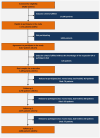Associations between patient characteristics and five-year trajectories of anticholinergic drug burden in older adults in German primary care: a prospective observational cohort study
- PMID: 40461149
- PMCID: PMC12142108
- DOI: 10.1136/bmjopen-2025-100005
Associations between patient characteristics and five-year trajectories of anticholinergic drug burden in older adults in German primary care: a prospective observational cohort study
Abstract
Objectives: To investigate the change in anticholinergic burden over a 5 year period in relation to the health characteristics of older adults.
Study design: Using data from the MultiCare Cohort Study (2008-2013), a prospective observational cohort study based on patient data from 158 general practices SETTING: Primary care in Germany.
Participants: 3189 multimorbid adults aged 65 to 85 years PRIMARY AND SECONDARY OUTCOME MEASURES: The primary outcome was the change in the anticholinergic burden score (ACB) over a 5 year period. The ACB was defined as the dependent variable and was calculated by including all anticholinergic drugs prescribed to participants during the study period. Independent variables included age, sex, education (according to CASMIN), depressiveness (GDS), cognitive function (LDST), quality of life (EQ5D-3L) and the number of diseases weighted by severity. We performed multilevel mixed-effects multivariable linear regression analyses.
Results: A total of 7068 observations were analysed during three follow-ups. The mean age of the participants was 74.4±5.2 years and 59.3% were female. The mean ACB score was 1.5±1.7 at baseline and did not change significantly over time. In contrast, a higher severity-weighted number of diseases (coefficient: 0.08, 95% CI: 0.05/0.10, p<0.001), a higher number of depressive symptoms (0.04, 0.004/0.08, p=0.030), poorer cognitive function (-0.03 to -0.06/-0.001, p=0.044) and poorer health-related quality of life (-0.05 to -0.08/-0.01, p=0.006) were associated with an increasing ACB score over time.
Conclusions: Our results show that anticholinergic prescribing increases despite the deteriorating health status of older adults, which may lead to higher hospitalisation and mortality rates. New practice recommendations for general practitioners may be helpful in raising their awareness of cumulative ACB and enabling them to discontinue or reduce the dose of some anticholinergics where possible. However, further research is needed to assess the impact of our findings on prescribing behaviour in primary care.
Trial registration number: ISRCTN89818205.
Keywords: GENERAL MEDICINE (see Internal Medicine); GERIATRIC MEDICINE; Multimorbidity; Polypharmacy; Prescriptions; Primary Health Care.
© Author(s) (or their employer(s)) 2025. Re-use permitted under CC BY-NC. No commercial re-use. See rights and permissions. Published by BMJ Group.
Conflict of interest statement
Competing interests: None declared.
Similar articles
-
Anticholinergic burden for prediction of cognitive decline or neuropsychiatric symptoms in older adults with mild cognitive impairment or dementia.Cochrane Database Syst Rev. 2022 Aug 22;8(8):CD015196. doi: 10.1002/14651858.CD015196.pub2. Cochrane Database Syst Rev. 2022. PMID: 35994403 Free PMC article.
-
Anticholinergic deprescribing interventions for reducing risk of cognitive decline or dementia in older adults with and without prior cognitive impairment.Cochrane Database Syst Rev. 2023 Dec 8;12(12):CD015405. doi: 10.1002/14651858.CD015405.pub2. Cochrane Database Syst Rev. 2023. PMID: 38063254 Free PMC article.
-
Systemic pharmacological treatments for chronic plaque psoriasis: a network meta-analysis.Cochrane Database Syst Rev. 2021 Apr 19;4(4):CD011535. doi: 10.1002/14651858.CD011535.pub4. Cochrane Database Syst Rev. 2021. Update in: Cochrane Database Syst Rev. 2022 May 23;5:CD011535. doi: 10.1002/14651858.CD011535.pub5. PMID: 33871055 Free PMC article. Updated.
-
Tiotropium versus long-acting beta-agonists for stable chronic obstructive pulmonary disease.Cochrane Database Syst Rev. 2012 Sep 12;2012(9):CD009157. doi: 10.1002/14651858.CD009157.pub2. Cochrane Database Syst Rev. 2012. PMID: 22972134 Free PMC article.
-
Systemic pharmacological treatments for chronic plaque psoriasis: a network meta-analysis.Cochrane Database Syst Rev. 2017 Dec 22;12(12):CD011535. doi: 10.1002/14651858.CD011535.pub2. Cochrane Database Syst Rev. 2017. Update in: Cochrane Database Syst Rev. 2020 Jan 9;1:CD011535. doi: 10.1002/14651858.CD011535.pub3. PMID: 29271481 Free PMC article. Updated.
References
-
- Krüger C, Schäfer I, van den Bussche H, et al. Anticholinergic drug burden according to the anticholinergic drug scale and the German anticholinergic burden and their impact on cognitive function in multimorbid elderly German people: a multicentre observational study. BMJ Open. 2021;11:e044230. doi: 10.1136/bmjopen-2020-044230. - DOI - PMC - PubMed
Publication types
MeSH terms
Substances
LinkOut - more resources
Full Text Sources

